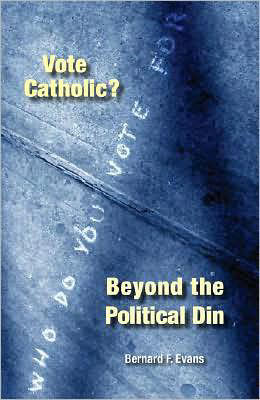
|
Posted June 2, 2008
Book: Vote Catholic? Beyond the Political Din Author: Bernard F. Evans Liturgical Press. Collegeville, MN. 2008. Pp.98 An Excerpt from the Jacket:
In Vote Catholic, Bernard Evans helps us get beyond the sometimes deafening din of these choruses. He takes us to the heart of an important third voice — Catholic social teaching — and shows how this teaching can inform Catholics as they wrestle with political choices. Without putting forward a particular platform or advocating particular candidates or positions, he presents a clear set of principles from the teachings to guide our decision-making process. With special attention to the Catholic position on life and human dignity. Evans shows that the issues and the solutions are more complex than our “headline news” world suggests. Complex though the issues are, Evan’s straightforward presentation will help readers go to the polls with faith and confidence. An Excerpt from the Book: Opting for the Poor Poorest families use 50 percent of their wages for rent. A 2007 report from the Department of Housing and Urban Development reveals that six million of America’s poorest families use most of their monthly earnings for housing. These six million families received no federal rent assistance. Housing experts point out that for the past several years our nation has been shifting money away from domestic assistance programs to pay for tax cuts and the wars in Iraq and Afghanistan. Government programs simply don’t have enough money to help those families most in need of housing assistance. This report on our nation’s failure to provide needed housing assistance to poor families is more than a story about housing issues. It brings to light the larger question: How serous are we about addressing poverty? In reference to the previous chapter, where do the needs of the poor fit in our efforts to promote the common good? Few among us would argue that we should not help people in need, especially if we claim to be followers of Jesus Christ. That position does not fit well with the one who went around healing the sick, feeding the hungry, dining with social outcasts, and proclaiming good news to the poor. We may disagree on how best to help persons in need, particularly those who are economically poor. Different strategies, however, do no suggest disagreement on the fundamental claim that as individuals and as a society we should reach out to help persons living in poverty. How does our recognition of this moral responsibility relate to the political process? More specifically, what does it have to do with voting? Catholic teaching always has stressed the need for individual citizens and for government policies and programs to assist the poor. Today, with greater democratic processes in place, how government responds in this area often is determined by how the voting public expresses its wishes through the electoral process. How we vote can be an important way for us to respond to the needs of the poor. This chapter focuses on the “option for the poor,” the second criterion in Catholic social teaching to guide our political choices. Table of Contents: 1. Connecting faith and justice 2. Promoting the common good 3. Opting for the poor 4. Protecting human life and dignity 5. Promoting a pro-life agenda 6. Roles 7. Beyond elections |
|
